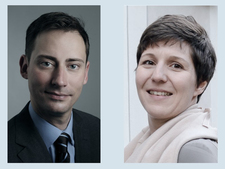-
Topics
subnavigation
Topics
Electromagnetic fields
- What are electromagnetic fields?
- Static and low-frequency fields
- Radiation protection relating to the expansion of the national grid
- High-frequency fields
- Radiation protection in mobile communication
Optical radiation
Ionising radiation
- What is ionising radiation?
- Radioactivity in the environment
- Applications in medicine
- Applications in daily life and in technology
- Effects
- What are the effects of radiation?
- Effects of selected radioactive materials
- Consequences of a radiation accident
- Cancer and leukaemia
- Genetic radiation effects
- Individual radiosensitivity
- Epidemiology of radiation-induced diseases
- Ionising radiation: positive effects?
- Risk estimation and assessment
- Radiation protection
- Nuclear accident management
- Service offers
-
The BfS
subnavigation
The BfS
- About us
- Science and research
- Laws and regulations
- BfS Topics in the Bundestag
- Links
Nuclear accidents: Increasing the focus on mental and social consequences
Experts of different organisations and institutions discuss nuclear emergency response measures
Year of issue 2016
Date 2016.10.28
Date 2016.10.28
- The interdisciplinary workshop was held on 24th and 25th October in Freiburg. On this occasion, experts of public authorities and scientists joined to merge their experience and knowledge in the fields of emergency response, radiation protection and social sciences so that their insights can be used to advance nuclear emergency response.
- They recommend that emergency response planning should increasingly take into consid-eration the mental and social consequences of nuclear accidents.
- The workshop's results will be passed on, among others, to the Commission on Radiological Protection, an advisory body to the German Federal Government, in order to foster further discussions and developments in nuclear emergency response.
Professionals in public authorities and scientists recommend that emergency response planning should increasingly take into account the mental and social consequences of nuclear accidents. This is the result of an interdisciplinary workshop organised by the Federal Office for Radiation Protection (BfS), the Federal Office of Civil Protection and Disaster Assistance (BBK) and the Centre for Security and Society at Freiburg University.
Germany updated its emergency response measures – on the basis of BfS studies – in the wake of the Fukushima reactor accident. These measures are supposed to protect the population from ra-dioactivity in the case of an accident. The updating included a significant enlargement of the so-called planning zones, i.e. areas where measures may need to be taken. "At the same time we are committed to increase the focus on the potential mental stress caused to the affected population and emergency personnel", said BfS spokesperson Anja Lutz, explaining the workshop initiative.
Limit psychosocial consequences
Emergency measures such as evacuation, relocation or decontamination of areas severely affect people's lives: Living in emergency shelters, losing their social and family environment, experiencing social exclusion at their new place of living and uncertainty as to the actual health risk due to the nuclear radiation – all these are severe stress factors. Such factors make it difficult to return to a structured daily routine and can cause mental illness.
The workshop determined that the training concepts for emergency personnel and crisis units but also for professional spokespersons, e.g. from the press departments in the institutions involved, will be an essential starting point for a limitation of psychosocial consequences. Both knowledge of radioactivity and radiological emergency preparedness and enhanced understanding of psychosocial aspects in emergency situations should be given higher priority. In addition, specific training arrangements for the existing, mostly voluntary first responders were regarded as useful.
The workshop participants also considered it a promising approach to increasingly involve the popu-lation in the preparation and management of nuclear disasters. "On the one hand, this could strengthen people's ability to self-help and self-protection. On the other hand, as we could see in other disasters, people show in fact a great willingness to help in emergency situations. We experienced this in flooding disasters and, most recently, in the management of the refugee influx. In this situation, a large number of people who are not usually involved in volunteering tasks immediately decided to help. It should be further investigated how and where volunteers can be deployed in nuclear emergency response," said Lutz.
Interdisciplinary workshop
Experts from German public authorities at federal and state level, from municipal emergency re-sponse, science and the energy sector came together on the occasion of the workshop "Management of psychosocial problems and communication concepts in nuclear emergency response" that was held on 24th and 25th October in Freiburg. The workshop was aimed at merging the experts' experiences and knowledge in the fields of emergency response, radiation protection and social sciences so that their insights can be used to advance nuclear emergency response. "We want to continue this interdisciplinary dialogue", Lutz emphasized.
The workshop's results will be passed on, among others, to the Commission on Radiological Protection, an advisory body to the German Federal Government, in order to foster further discussions and developments in nuclear emergency response.
Background
On 11 March 2011, an earthquake and a subsequent tsunami triggered the Fukushima reactor accident. Material safety installations failed, radioactive substances were released into the environment over several weeks. The sobering conclusion can be drawn that while the public authorities were able to largely protect the population from radioactivity, they were unable to prevent the severe indirect consequences: people living in emergency shelters for years, uncertainty, social exclusion, loss of social and family environment. All this happened in a democratic, industrialised country so that the social consequences can be compared to a hypothetical incident in Germany.
State of 2016.10.28



